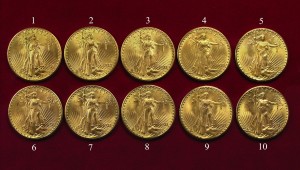
The ten 1933 Saint-Gaudens Double Eagles confiscated by the government from Joan Lanbord, daughter of Israel Switt.
Shortly after the sale of the Farouk-Fenton 1933 Saint-Gaudens Double Eagle coin, currently the example that is legal to own, in 2002 for $7.59 million at auction ($10.23 million accounting for inflation), Joan Langbord, daughter of Israel Switt, was searching through her late father’s boxes and found ten of these coins. Langbord then sent the coins to the U.S. Mint to authenticate. After a period of time, the Langbords inquired about the coins. They were told the coins were genuine and would not return them, calling them stolen items.
Langbord and her son Roy Langbord hired Barry Berke to help retrieve the coins. Berke was the attorney for British coin dealer Stephen Fenton who was arrested by the U.S. Secret Service when trying to buy the coin at the famous Waldorf-Astoria Hotel in New York in 1996. Berke negotiated Fenton’s release from prison and the subsequent sale at the July 2002 auction.
After the U.S. Mint refused to return the coins, the Langbords sued the government in 2006. The case went to trial in 2011 with a jury verdict against the Langbords. After the ruling, Assistant U.S. Attorney Jacqueline Romero, the government’s lead attorney in the case, came out with a courthouse statement, “People of the United States of America have been vindicated.” Do you feel vindicated?
The case was appealed to the U.S. Court of Appeals for the Third Circuit in Philadelphia.
In a hearing in 2015, Judge Marjorie O. Rendell ruled that the government was too aggressive in its actions and that the lower court judge erred in evidence handling. A subsequent three-judge panel upheld Judge Rendell’s ruling and ordered the government to return the coins.
The government appealed the ruling and asked for a full-circuit hearing. Called a ruling en banc, in 2016, a full panel of 12 judges ruled 9-3 that they agreed the lower court made mistakes in the presentation of evidence but they did not feel that there was not enough evidence that could overturn the ruling. The Appellate Court overturned the appeals and reinstated the original verdict.
Berke, on behalf of the Langbords, asked the Supreme Court to review the ruling of the Third Circuit. Officially, it is called a petition for a writ of certiorari. The petition was filed on October 28, 2016.
On April 17, the petition was denied. Justice Neil Gorsuch did not take part in the decision since he was not on the bench at the time the petition was filed.
Attempts to contact Burke have not been successful.
The inconsistency of how the government has handled the many different cases of coins that were not supposed to be in public hands is infuriating. Although the government has a history of confiscating the 1933 Double Eagles, the 1913 Liberty Head Nickels remain out of government control while the 1974-D Aluminum Cent was confiscated, while the 1974 Aluminum Cent pattern that was allegedly given to janitor by a member of congress was allowed to be sold at auction.
Patterns were never supposed to leave the U.S. Mint yet after the William Woodin served as Franklin Roosevelt’s first Secretary of the Treasury, the government has not tried to confiscate patterns. Woodin was a collector of patterns and trial coins who also had Roosevelt exempt “rare and unusual coin types” when writing the order to withdraw gold from private hands.
Even if the Third Circuit agreed that the evidence was not handled properly by the lower-court judge under the terms of the law, how can they tell whether a retrial would yield a different outcome? Why not return the case and retry the case?
While I love reading a good conspiracy theory, I find many difficult to understand how all of the moving parts can work in unison for or against anything. However, there are aspects of this story where a good conspiracy theorist could spin quite a tale.
Saying, “there ought to be a law” is usually not the real answer to many problems. However, maybe it is time to reconsider that feeling to force the government to act consistently. Considering how congress has turned dysfunction into fine art, I do not see this ever happening.
Do you still feel vindicated?


Yes, I do feel completely and utterly vindicated. “We” won. The Langbords possessed the fruit of a poisoned tree.
And what about the 1913 Liberty Head Nickels? Should they be confiscated since their fruit came from a poisonous tree?